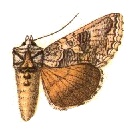
Schinia, commonly called flower moths, is a large genus of moths belonging to the family Noctuidae. The genus has a Holarctic distribution with the vast majority of species being found in North America, many with a very restricted range and larval food plant.
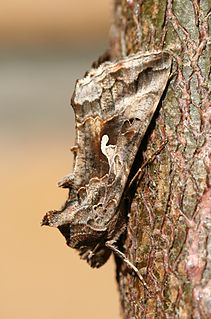
Plusiinae is a smallish subfamily of the moth family Noctuidae. As the Noctuidae appear to be a paraphyletic assemblage, the Plusiinae may eventually be raised to family status.

Syngrapha is a genus of moths of the family Noctuidae.

Syngrapha rectangula, the salt and pepper looper or angulated cutworm, is a moth of the family Noctuidae. The species was first described by William Kirby in 1837. It is found in North America from Newfoundland, Quebec, northern Ontario to Manitoba, New Jersey, northern Pennsylvania, southern Michigan, northern Wisconsin, North Carolina, Virginia, British Columbia, Alberta, Montana, northern Idaho and the Cascades.

Syngrapha abstrusa, the abstruse false looper, is a moth of the family Noctuidae. The species was first described by Thomas D. Eichlin and Hugh B. Cunningham in 1978. It is found in North America from Newfoundland to New Jersey, southern Canada, Montana and northern New Mexico.
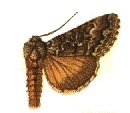
Syngrapha alias, the hooked silver Y, is a moth of the family Noctuidae. The species was first described by Rodrigues Ottolengui in 1902. It is found in North America from Newfoundland to Alaska and Vancouver Island, north to near the treeline and south in the west to coastal north California and Arizona, in the east to North Carolina.
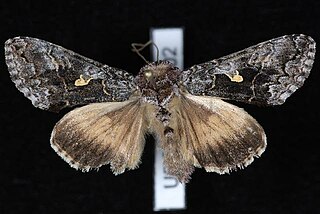
Syngrapha celsa, the plain silver Y or western conifer looper, is a moth of the family Noctuidae. The species was first described by Henry Edwards in 1881. It is found in North America from British Columbia to California, Idaho, Nevada, Arizona and New Mexico.
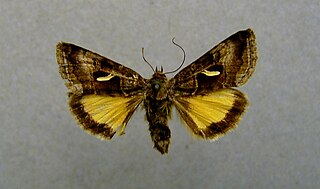
Syngrapha hochenwarthi is a moth of the family Noctuidae. It is found in the Alps, the mountainous areas of Northern Norway and Finland, the Ural mountains, the Balkan, the Caucasus and the Altai mountains.
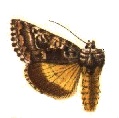
Syngrapha octoscripta, the figure-eight looper moth or dusky silver Y, is a moth of the family Noctuidae. The species was first described by Augustus Radcliffe Grote in 1874. It is found in North America from coast to coast in most of Canada south in the east to northern Pennsylvania, Ohio, and the Great Lakes states.

Syngrapha microgamma, the little bride looper moth, is a moth of the family Noctuidae. The species was first described by Jacob Hübner in 1823. It is found in much of Canada south in the east to southern Maine, northern New York, and the Great Lakes states. In Europe, it is found from Fennoscandia and central Europe east to mountains eastern Asia.

Syngrapha epigaea, the pirate looper moth or narrow silver Y, is a moth of the family Noctuidae. The species was first described by Augustus Radcliffe Grote in 1874. It is found from coast to coast in Canada south in the east to Pennsylvania, Ohio, and the northern Great Lakes states.

Syngrapha orophila is a moth of the family Noctuidae first described by George Hampson in 1908. It is found in western North America from extreme northern British Columbia and the Queen Charlotte Islands, south and east to southern Oregon, western Wyoming and Montana and western Alberta.
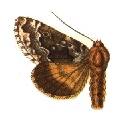
Syngrapha angulidens is a moth of the family Noctuidae first described by Smith in 1891. It is found from Alaska south in the mountains to northern Oregon, western Nevada, Arizona and New Mexico and east to Colorado, western Wyoming, Montana and Alberta.

Syngrapha alticola, the alticola looper moth or alpine beauty, is a moth of the family Noctuidae. The species was first described by Francis Walker in 1858. It is found across the Arctic of North America, above the treeline from Newfoundland to Alaska, south in the mountains to central California and Colorado.
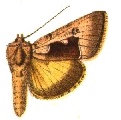
Syngrapha diasema is a moth of the family Noctuidae first described by Jean Baptiste Boisduval in 1829. It is found from northern Fennoscandia to Siberia, across the Arctic and subarctic. In North America, it has been reported across the Arctic and subarctic from Labrador to central Alaska.
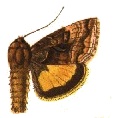
Syngrapha ignea, the mountain beauty, is a moth of the family Noctuidae. The species was first described by Augustus Radcliffe Grote in 1864. It is found from northern Alaska south to southern California and New Mexico, with a disjunct population in Labrador. It is also found sparingly across the boreal forest and the subarctic.
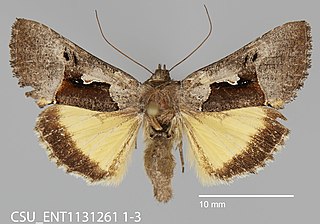
Syngrapha borea is a species of looper moth in the family Noctuidae. It is found in North America.
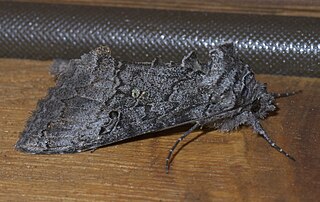
Syngrapha viridisigma, known generally as the spruce false looper or green-marked looper, is a species of looper moth in the family Noctuidae. It is found in North America.
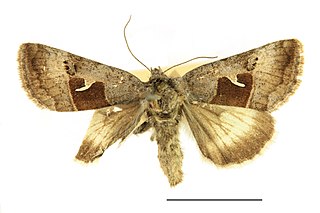
Syngrapha parilis is a species of looper moth in the family Noctuidae. It is found in North America and Europe.
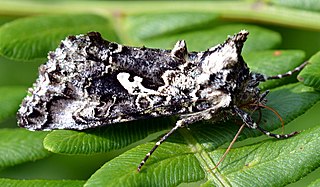
Syngrapha cryptica is a species of looper moth in the family Noctuidae. It is found in North America.
